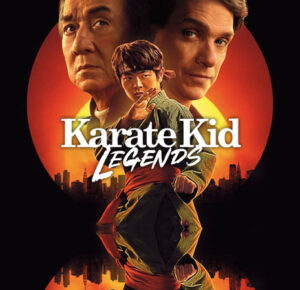
“Daisy” Korean Theatrical Poster
Director: Andrew Lau
Writer: Felix Chong
Producer: Hoon-tak Jung
Cast: Jeong Woo-Sung, Jun Ji-Hyun (Gianna Jun), Lee Sung-jae, Cheon Ho-Jin, Simon Yam Tat Wah, David Chiang Da Wei, Yu Sun-Cheol, Dion Lam
Running Time: 110 min.
By Paul Bramhall
On paper Daisy reads like an Asian action thriller fan’s dream. A Korea and Hong Kong co-production (which translates to Korea being in-front of the camera and Hong Kong being behind it) shot entirely on location in the Netherlands, the production boasts an enviable pool of talent from both countries. Directed by Andrew Lau and written by Felix Chong (with the assistance of Jin Gan-san and Kwak Jae-yong), in 2006 the pair were still hot off the tail of being the duo behind the Infernal Affairs trilogy.
Here they provide us with a story that focuses on 3 Koreans living in Amsterdam – Lee Song-jae plays an Interpol agent, Jeong Woo-seong plays a hitman working for the Chinese mafia, and Jeon Ji-hyeon plays a street painter who gets caught up in the middle of everything. For good measure, throw in Shaw Brothers legend David Chiang as the boss of the organization that Woo-seong works for, and an action director in the form of Dion Lam. It’s fair to assume that with the people involved, the end result should be a winning combination.
There is, however, a slight caveat which may impede audiences enjoyment of Daisy, and that is that it’s not an action thriller at all. Despite the names involved, Daisy is in fact a romantic melodrama. Perhaps Lau wanted to have a crack at a different genre, but decided to try and pull it off using the types of characters he was familiar with dealing with. Lau has had a long career in the industry, and before Infernal Affairs he was most well known for directing a series of wuxia movies in the late 90’s – most notably The Storm Riders – which pushed the envelope for what Hong Kong could do with CGI at the time. Daisy was made in-between his car racing manga adaptation Initial D, and Confession of Pain, which was an unsuccessful attempt to recreate the style of genre filmmaking that made Infernal Affairs such a success.
To his credit, while Lau’s decision to basically make a Korean movie may have been a risky one, he was certainly successful in getting some big names to come onboard. Lee Seong-jae was still considered A-list material in 2006, having been in everything from Bong Joon-ho’s debut, the dark comedy Barking Dogs Never Bite, to gritty action flicks like Holiday. Likewise for Jeong Woo-seong, while at the time he was still 2 years away from starring in The Good, The Bad, The Weird, which gained international recognition, he still had several notable roles under his belt, such as his memorable character from Musa. Of course Jeon Ji-hyeon is most recognizable as the title character of My Sassy Girl, and at the time Daisy was a significant departure from the type of slightly wacky characters her career had been defined by to this point.
It’s worth noting that there are 2 versions of Daisy – the theatrical cut and the director’s cut. The version I’m reviewing is the director’s cut version, and for full disclosure I’ve never seen the theatrical cut. What I do know is that the director’s cut is 25 minutes longer than the theatrical version, pushing it to almost 2 hours, and significantly re-orders the scenes, so that the narrative plays with the timeline of how events unfold.
One of the changes I can definitely say applies to the director’s cut is how the movie begins. Over a third of the total runtime is dedicated to following the events that lead up to a fateful shootout in the town square, but it takes the time to be told from each of the 3 characters perspectives. From the opening shot we see Jun Ji-hyeon whimsically musing on when she’ll find her one true love in voiceover, learning that she lives with her grandfather who runs an antique shop, and in her spare time she paints tourists portraits in the town square. Ji-hyeon has been receiving a pot of daisies delivered outside the antique store every day for several months, and although she has no idea who they’re off, she hopes that the sender could be the guy for her.
When Song-jae, the Interpol agent, discovers that the gangsters he’s tracking are using a location in the town square, he realizes that the spot where the portrait artists sit is the perfect position to observe them without being conspicuous. Of course, the portrait artist he chooses to paint him is Ji-hyeon, and as it just so happens that the day he chooses her is also the day he himself is carrying a pot of flowers, she becomes convinced that Song-jae is the mystery daisy sender.
But wait! Enter hitman Woo-seong, whom we learn that after performing a hit, usually waits for the heat to cool off at a cottage in the countryside. That cottage also happens to look out onto a field of daisies that Ji-hyeon often comes to paint, so watching her from a distance, he finds himself becoming silently enamored with her innocent beauty. Hence, it’s actually Woo-seong who’s sending her the daisies, and he even goes so far as to rent an apartment overlooking the town square where she paints, so he can observe her every day instead of just now and then. See his rule is to never make direct contact, it’s a hitman thing.
So we have a perfect love triangle setup, however Dion Lam is onboard for a reason, and that reason becomes evident when the gangsters realize what Song-jae is up to. At this point Woo-seong has learnt that Song-jae is a cop that’s been developing a relationship with Ji-hyeon, so instead of continuing to sit there depressed in his apartment window watching them together, he’s given a choice. With the gangsters about to take out an unsuspecting Song-jae, does he allow his jealousy to let them do it, or will he do the right thing and come to his aid? Of course things get messy, and it’s the innocent Ji-hyeon who ends up coming off worse in the ensuing gun battle.
If the above description sounds a little similar to John Woo’s The Killer, it’s understandable. A cop and a killer both wanting to come to the rescue of a damsel in distress, who gets maimed due to their actions, the comparison is inevitable. However unlike Sally Yeh, Ji-hyeon doesn’t lose her sight (I’d consider it a spoiler to reveal what happens though, so I won’t.) While The Killer was very much about Chow Yun Fat and Danny Lee bursting into action, guns blazing, with Yeh’s blindness serving as the reason for them doing so, Daisy is the opposite. Song-jae and Woo-seong both want to capture Ji-hyeon’s heart, and occasionally it involves firing off a few bullets. A perfect example of the difference is when Woo-seong goes on a date with Ji-hyeon, and pops out for a couple of minutes mid-way through to perform a hit, before coming back to carry on were they left off. You know what type of movie you’re watching when the date is the focus, and not the hit.
Daisy relies on the voiceover technique a lot, arguably to the point that at times it results in a disconnect to what’s happening onscreen. On the other hand sometimes it works to keeps things interesting, particularly when one of the many shots of characters brooding in slow motion is given some narration. It somehow manages to make it feel a little less pretentious than just watching them brood in silence. These shots could work under a director like Wong Kar-wai, but here Felix Chong’s story relies a little too much on coincidence and disbelief to give the scenes any weight. Aspects of the movie like Song-jae and Woo-seong constantly letting the other go, because they know Ji-hyeon would be upset if either of them got hurt, come across as laughable rather than admirable. It takes a certain type of director to be able to convey bromance effectively, and Lau is no John Woo.
Once the shootout in the town square is over the movie also suffers, at times feeling like it’s going to stutter to a complete stop. With Song-jae back in Korea, Woo-seong decides to take a chance with Ji-hyeon, however it simply makes all his prior actions seem like that of a stalker rather than a love sick hitman. In part his acting is to blame, while movies like 2014’s Scarlet Innocence and 2013’s Cold Eyes show just how much his acting has matured, here some of his looks and line delivery come across as more creepy than tortured soul. Of course Lau should also take responsibility, and it makes me speculate as to if the reason why there’s so much voiceover is because he couldn’t confidently direct when the lines are being delivered in Korean.
With a decidedly downbeat tone permeating through most of the movie, Daisy is a hard sell both to fans of melodrama, and to those expecting a dose of action. By the time Woo-seong loads up to raid David Chiang’s headquarters close to the end of the 2 hours, the pace has been so gloomy that even the promise of some action, which does indeed get delivered, is difficult to get excited about. With this in mind, perhaps it’s best to leave this Daisy unpicked.
Paul Bramhall’s Rating: 5.5/10











 Every film genre – action, science fiction, horror, comedy and even animated – has had a series of memorable villains that have stuck with us for most of our lives. Whether it be a sadistic teenager portrayed by James Spader; an emotionless cyborg represented by Arnold Schwarzenegger; a suave, humorous terrorist leader played by Alan Rickman; or even a scarred lion voiced by Jeremy Irons – it’s the bad guys who make the classics so great!
Every film genre – action, science fiction, horror, comedy and even animated – has had a series of memorable villains that have stuck with us for most of our lives. Whether it be a sadistic teenager portrayed by James Spader; an emotionless cyborg represented by Arnold Schwarzenegger; a suave, humorous terrorist leader played by Alan Rickman; or even a scarred lion voiced by Jeremy Irons – it’s the bad guys who make the classics so great!
 PAI MEI
PAI MEI BASEBALL BAT MAN
BASEBALL BAT MAN THUNDERLEG/THUNDERFOOT
THUNDERLEG/THUNDERFOOT MR. HAN
MR. HAN THE THREE STORMS
THE THREE STORMS HAKIM
HAKIM HAMMER GIRL
HAMMER GIRL










Be the 1st to Comment